Everyone knows a Mustang, either as a horse, a car or a plane, but Mustang is also a name who inspired many rockers just as these Belgians, who became quite legendary, not only in the north-east of Belgium, but also by rock fanatics around the world.
Although it was not Staf De Peuter (from Rijkevorsel) who grounded the band; it’s he who is the first from their classic line-up who started a band together with some schoolmates in the early months of 1965. Together with Fil Callaerts (+) on drums, Jef Van Es and Willy Vervoort both also on guitar, they called themselves The Tyfoons. Staf (b.1948.06.16) got his first guitar at the age of 14 but before that he played the accordion (since he was 6!) encouraged by his dad. He was exceptionally good at it and won a lot of competitions and even became world-champion at the age of 13! But it was the guitar who stole his heart by listening to the radio and when he finally got one in 1962, he started learning by playing along those songs. This first band The Tyfoons were just one of those beat bands who played the popular hit-songs. By the end of 1965, the singer Willy Vervoort had to leave the band to do his military service and so he was temporary replaced by Guy Mertens (b.1946.07.11) who also played bass besides singing. Guy enjoyed being on stage for the first time, but after a year this boy he had replaced rejoined The Tyfoons so that Guy was no longer needed. That’s when he decided to opt for a new name (Danny Morgan) and form his own band, named after the elegant but powerful horses: The Mustangs! The name-change to Danny Morgan was done to differ from another pop-group (from Mechelen) who also called themself The Mustangs.

It was 1966 when that very first Mustangs line-up was founded; André Engelen (+) on guitar Roger… on bass, Staf Auwermans on drums, Willy Mols on organ and Guy “Danny Morgan” Mertens on vocals. Soon they had a lot of work playing at dances the popular hit-singles like The Shadows, The Boxtops (The Letter) or The Equals (Baby Come Back).
However, after two years Guy thought it was time for a change to take things a bit more seriously. He formed a completely new line-up with Walter Claeymans playing the bass, Ronny Langmans on drums, Chiel De Hauwer on organ and guitar, while Alex De Vogel played lead-guitar.

They introduced a few own songs in the set-list and soon a local record company “Ideal Records” approached them; if they were interested in recording a single… A part of the recording they had to pay themselves but in return they could have 300 singles to sell at their shows. They made the deal and soon they were in the Brussels Decca Studio’s to record “Stop It Baby” and “Shake It”.
“Stop it” was one of those songs you can’t get out of your head when you have heard it. They both were written by Guy but the boss from Ideal arranged to put his name (L. Gandor) as co-author on it as well. The 7” sold good and thanks to some airplay on radio Luxemburg, Ideal records managed to sell all 2500 copies. Needless to say the company soon asked another 45er. This time the boys recorded “Tortured Prisoner” and “In A Moment 0f Love Darkness” in Brussels, so that it still could be released before the new year 1969. “Tortured Prisoner” was quite a heavy song, who didn’t worked this time on the radio.

But it was, complete with prison chains and scream, a fine indication of the music Guy was interested in. Surprisingly it was not “Danny Morgan & The Mustangs” on the sleeve as Ideal records had made a mistake and wrote down “Guy Morgan & The Mustangs”. This was also the first recording for the 15 year old Gust Meerts (b.1953.07.25) who had replaced Ronny on the drums.
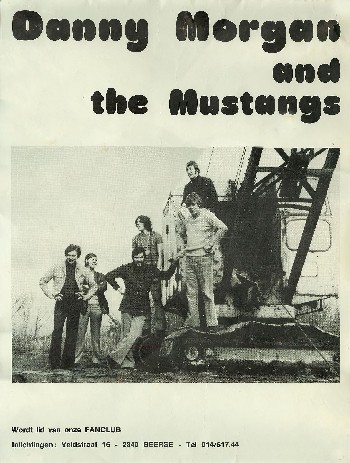
Another youngster who used to play dances together with his dad since early age. His father played drums himself and so it happened that little Gust played some songs to replace his dad when he took a break on stage. Gust was 13 when he joined his very first pop group called Kino and the Pearlfishers. It was Alex De Vogel who made Guy aware of the fact that there was a great young drummer in Beerse. They asked Gust to come over at a rehearsal to try-out but when Ronny heard about it he decided to leave the band. Gust: “so they left me being full member of Mustang with only one week to study the entire set-list as there was a gig that weekend!”
Despite the records, it were especially those live concerts who gained the band a huge following. By that time they could be booked as a seven-piece to play an extra set of soul music. Therefore they had added Guy’s brother Ludo “sax” Mertens (b.1944.01.27) who played saxophone and also a trumpet player who was quickly replaced by Jef Sas (b.1948.03.10).
The band was by then supported by a real fan-club run by Dré Claessen (with more than 500 members!) who produced a magazine called “Het Mustangske”; people got informed about activities and gained reduction at shows. One of the actions was on Nov 1st 1969 at Wechelderzande; every 100th entrance got a 7” for free; they had to give twelve singles that evening! Another fine initiative were the bus trips organised when the band played in Holland; those days the fans followed their boys all the way…

Guy was also thinking on adding an extra guitar-player as he possibly had to go to the army himself and he didn’t want to put the band on hold for a year. Alex was supposed to take over the singing cause he had a good voice, helped by an extra guitar to play half of his parts. Ludo suggested his friend Staf De Peuter.
His band The Tyfoon’s had fallen apart as he also had gone in military service. After a year of inactivity Staf had joined a dance-orchestra The Trillers; where he played, besides the guitar, his old accordion. Since the summer of 1969 he had left those Trillers for another local band (from Hoogstraten): The Jivaro’s. This band was grounded in 1967 by Jan (on drums) and his brother Theo “Tex” Vandelooverenbosch (on bass) with Pol Moonen (guitar), Chiel Hendrix (also guitar) and singer Johan Kriek. Right after the first Jivaro’s concert it was Guy Mertens who asked Tex if he wasn’t interested in joining his band The Mustangs to play the bass. Of course Tex said no, as he really felt comfortable in his new group. The Jivaro’s were another outfit who had started as a pop group but after one year those guys discovered Jimi Hendrix and Cream and wanted to play just as them. Playing such heavy music around that time did meant playing less shows, but the people who liked it were fanatic about this band. When Staf De Peuter replaced Pol Moonen (+) the Jivaro’s-sound changed to less “power-trio” influences but it still stayed the hardest band from that region.


It was already 1970 when Staf joined Ludo to go and watch a Mustang rehearsal. During a break Guy asked him to play something while Alex took off quite angry, leaving Staf as the new Mustang guitar-player. Staf was glad he would be able to play every week now; although he still preferred the heavier music he had discovered with The Jivaro’s.

With Staf as new guitar player the overall sound of the band became a bit more rocking while the name became simply “The Mustangs”. Songs as Shocking Blue’s “Venus” were dropped in favour of heavier stuff such as The Kinks, Santana, Rolling Stones (Brown Sugar), Blue Cheer (Summertime Blues) and especially a lot of Creedence Clearwater Revival songs.
Needles to say this kind of music was excellent to improvise and therefore no Mustang show was identical to another.
The following months Mustang played a lot of shows but the line-up still changed quite a bit. Chiel De Hauwer choose for a softer sound and joined his mates Alex & Ronny at their new band Forever Five and since then Jef Sas also played the organ. But all those changes were good for the band as they became a solid unit mainly thanks to the weekly playing; not the odd 1.5 hour set but still the 5 hour set to fill a complete evening. Ludo remembers; “it were those exciting gigs who started the buzz going; there were Monday’s we had up to six telephones to book the band. A lot of gigs like the “Zaal Van Dijk” in Merksplas and “Het Witte Paard” in Beerse were absolute mayhem; a packed crowd of 1200 people dancing, even on the tables for about five hours”. Everybody enjoyed himself; on one gig Jef Sas was seen behind his organ without trousers; something that caught the others in laughter. Besides the popular rock songs (“Sea Cruise”, “Wounded”, “Paranoid”,….),Guy brought in more and more own tunes. (“Answer Me”, “She’s Mine”, “What A Mess”).
In the fall of 1971 Walter decided it was time for a change. He also wasn’t happy with the new more rocking direction the band was heading and therefore he decided to join his old colleges at Forever Five.
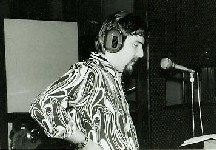
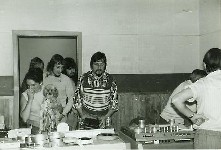
Firstly he was replaced by the talented Eric De Blezer who was very dedicated and came by bus to the concerts and rehearsals as he lived in Boom; a town not exactly near the others. He was in the band for about a year until he started a new band Fetisj. He was replaced by his predecessor Walter Claeymans, but things didn’t worked as it should with Walter and so came, later on in 1972, that Eric temporary replaced Walter for some concerts.
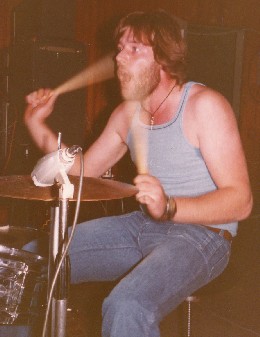
From a band who played dance hall’s since 1968; named The Rimi’s; came the next bass-player Dré van Miert (b.1953.06.26) (who could play sax as well, replacing Ludo Mertens). Dré insisted in bringing along his friend guitar-player Jef Sas (b.1951.08.08) from Vosselaar. This made Mustang probably the only band in the world who had two different musicians in the band with the same name, who weren’t even family! But these situation didn’t last long as the first Jef would left Mustang at the beginning of 1973. One more musician who had to do his military service was Gust, temporary replaced for that year by Eddy Janssens from Lommel.
Those months in the fall of 1972 some rumours occurred that Ideal records would fusion with a bigger record company but the whole deal got off and by then, it was still Ideal records who asked for another single. The boys decided to record two of Guy’s songs (although the record company boss once again added his name to it) “Sweeter Than Honey” for the A-side was a search for radio airplay while crowd favourite “What A Mess” was a boogie rocker. The recording in Brussels was a pretty frustrating experience as Staf recalled: “the engineer was an old fellow who kept shouting to turn things down; he simply didn’t let us play “what a mess” as we were used to, so the guitar was recorded on low volume which changed the song completely”. When it was released by the end of 1972, the sleeve simply mentioned “Mustang” on it for the first time. In January of the following year the band got an offer to record one of their songs “It’s A Long Way” at the Philips studio’s in Holland but after all nothing concrete happened.

The general direction of Mustang became more heavier, something that differed them from other bands around so they decided to leave the soul set behind. Fans always asked to play their favourite (hardrock-)songs and this extra guitar from Jef Sas gave them the opportunity to play such music. A song like Black Sabbath’s “Paranoid” was played every night but also Golden Earring (Holy,Holy Life), Guess Who (Share The Land), Blodwyn Pig, Slade and Sweet (later one of the most requested songs was Sweet’s Blockbuster as Dré had got them an original siren to go along with the song). The older songs from their singles were only played when someone requested them.
When Gust rejoined in 1973 after returning from the army, Dré and Jef decided to keep playing with Eddy. Athough they knew Eddy only for about a year they got along very well and so they all left Mustang to form Astrix, leaving the others as a trio. Guy had to pick up his bass again but they only played a handful concerts as a trio (one in Beerse at hall “Witte Paard” was especially well received). Also Walter Claeymans rejoined for a few months but after all, he figured out that Mustang still wasn’t the right band for him.
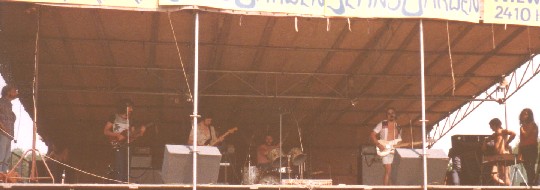

In 1974 it was clear that the golden-years of dance-halls were over (also because the disco music started to get huge) as Mustang got more and more offers from youth-clubs and festivals to play. The audience asked more heavy stuff and did care less about the charts; an evolution Guy liked a lot as he wrote some fine (hardrock)songs during those years. The band decided to concentrate on own work and possibly write a complete album. They needed an extra rhythm-guitar and therefore Jef Sas was asked to come back. Jef accepted as he hadn’t been playing during a year. His band Astrix he had started with Eddy, Dré and former Rimi’s singer Ludo Van Deuren had only lasted a year and he was eager to play again.
Jef remembers those months well: “I only bought my Vox organ then when Guy asked me to play on a few songs. We constant rehearsed new songs and worked them immediately into the set list. Probably a few of those compositions never made it to the recording studio“.
“The Ballad Of Bobby Dry”, “Number Nine”, “Get Me A Plane”, “Christine”, “I Send My Blues” and “Lady love” are some of those songs that were written during those months of ‘74/’75 but never got recorded on tape.
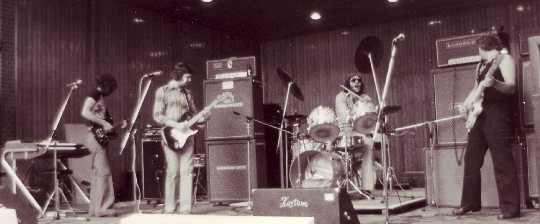
Mustang continued gigging with a set list half of own material, while the other half were less known cover songs from bands as Uriah Heep, Rory Gallagher, Status Quo, Thin Lizzy, Ted Nugent (Snakeskin Cowboys), The Allman Brothers Band (It’s Not my Cross To Bear, Statesboro Blues), Deep Purple (Child In Time, Highway Star), The Free (All right Now) & The Small Faces (All Or Nothing). Guy organised some concerts himself to find the money to record their album. During this period the band also got themselves a manager; Xavier Denies (+) succeeded to gain a lot of attention on his boys and arranged them a lot of concerts. Up to then, it was always Guy himself who had to be booking-agent at the same time. Xavier also took care of the fan club as well as the bus trips.
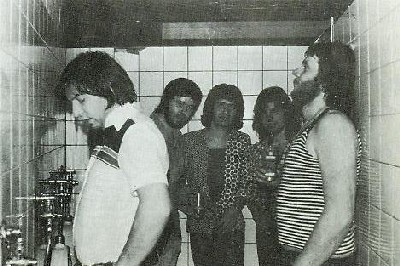
The album was finally recorded in Heist Op Den Berg at the Tamara King Studio’s, a studio they were rebuilding at that period; so it happened quite a few times that the workers had to stop for a few minutes to keep it silence for the recording.
The studio was owned by Luc Derdin who had a record company called Monopole. Former bass player Dré van Miert started working as an engineer in this studio and it was he who produced the album. Dré worked out a deal with Luc Derdin to release the album on a joint venture; named Eagle System; where he brought in the money for release.

By the end of 1976, just in time to be mentioned on the record-cover, they found a new bass player: Tex Vandelooverenbosch (b.1949.11.21), this time finally agreed to join Mustang. Almost three years after The Jivaro’s Tex had joined Desperated Company, a local band he changed very quickly for Canabis Sativa.
This band was risen out of the ashes of symphonic rock band Poldergeist. But symfo was not his kind of music so in 1974 he changed it in favour for rock band Ginger. It was Ginger who was with Mustang on the same bill at the 1976’ Kioskival-festival in Rijkevorsel. As he always tried to play originals instead of cover-songs, Tex was really impressed about the songs Guy had written and decided to join after all.
In January 1977 a British agency showed interest in the Mustang tapes and even later they wanted Guy to come over for a test for a famous British band; an offer he finally turned down, knowing that his own music would soon be released.
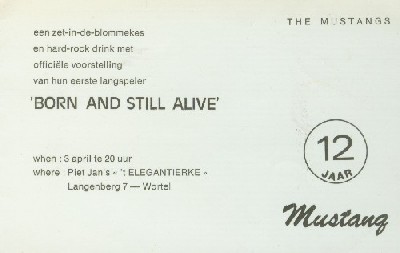
After two years of hard work the album, “Born And Still Alive” was finally released on April 3th, 1977 with a special show at their favourite club: the “Eglantierke” in Wortel. First there was a projection of some old Mustang-films and after that, they played the album in a 45 minute set.
Although it contained eight great songs of pure hard-rock, absolute highlight was the almost 12 minutes long “The Man Who Lives Next Door” with heavy/soft dynamics (with Guy playing the flute and Staf even accordion!) an epic in “Child In Time-style”.
Although the music still stands to this day, a lot of people who used to see the band on stage for so many years, were a bit disappointed that the real Mustang “live” power was not captured on this recording.
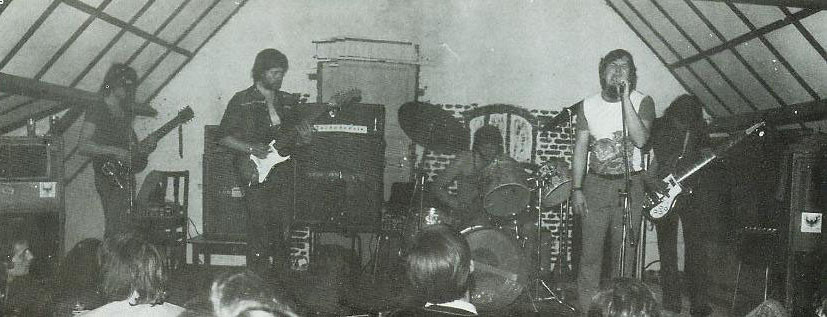
The sleeve was done by Willy Geets and showed the birth and life of the mustang to analogy from the bluesy title-song where Guy wrote down the lyrics to describe the life of the band. All songs were written by Guy Mertens (who surprised a lot of people with his strong lyrics), only “Kickin’ In Blind Doors”; the albums most heavy tune, was written by Jef Sas with lyrics from Guy. Jef about this: “It happened more and more that I had some ideas and riffs for songs, but I felt myself inhibited as I was only the second guitar player in the band”. One of the recorded songs; the great boogie rocker “Visions Of Virgin Gnome Copper”(with an organ solo!) was left off, despite that this was another fine example what a great storyteller Guy was in his lyrics. The album was made -as a thanks to the fans- to sell without profit and therefore all 500 copies were soon sold out. Guy explained: “As we play here for about twelve years, we were lucky to have very supportive fans and that’s why we thought it was time to do something for them; but at the same time this lp is also a document for us so that we can look back on it all later”.

A few weeks after the presentation Mustang got a 30 minute interview on national radio BRTR; this special entitled “muziek is muziek” was made at the bands rehearsal room. Thanks to the album and the fine press-reviews of it, they were asked to play a lot of shows, a lot of it on festivals. They shared the stage not only with Belgian bands as Blue Rock, Banzai, Tjens Couter, Lee, Irish Coffee, The pebbles, Ferre Grignard but also some foreign acts as Kayak, Kevin Coyne, Living Blues and The Bintangs.
Life on the road was not always sunny like that night they were booked at the legendary “Muze” club; the old Fiat truck (bought from Five From Dave) broke down so they never made it up there. Sometimes when headlining the band still played two 60 minutes sets (or even 90!) with a lot of cover-songs like Eastbourne Ladies (Kevin Coyne), Sunshine Of Your Love (Cream), Gloria (Them), Born To Be Wild (Steppenwolf) besides the album cuts.

On July 2nd,1977 the band headlined the Jeuzelfestival in Wuustwezel. André Van Miert who was the sound engineer on that day managed to record all bands and convinced Luc Derdin to release an album from these tapes as the quality was rather good for a low budget recording. From the Mustang set they choose two blues-rock cover songs: “Baby What You Want Me To Do” and “States Boro Blues” to be released on this compilation album a few months later.
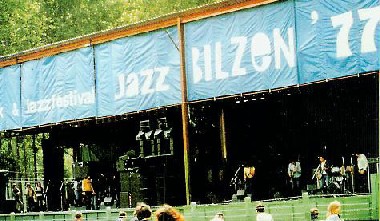
Another remarkable fact was winning the Bilzen festival-finals for amateur-bands on July 23th; they had more luck than the year before as this time it gained them a place on the bill of the actual festival! It was august 11th, 1977 when Mustang opened the 13th Bilzen Rock & Jazz festival with a storming performance.





A lot of nerves right before everybody was ready to go on stage, because singer Guy was not yet arrived. 10 minutes before the actual kick-off the organisation said no delay was allowed and they would break-up the gear again, but at that very moment Guy showed up, dead-calm, and jumped right on stage. Even the always critical Marc Mortier from Humo magazine wrote a fair review on Mustang.

Another festival they played for the thirth time was Kioskival in Rijkevorsel; this time (September 4th) with Dizzy Mans Band headlining.

Now that the band was really hot and their name began to spread nationwide something unbelievable happened: singer Guy Mertens announced he decided to stop by the end of the year. Nobody understood how it was possible to leave your own band as a founded member at it’s very height….
He played his last show on December 23th, 1977 leaving the others a bit desperate for the next few days. But after the initial shock Staf, Gust, Tex and Jef decided to continue the band with some new recruits. They played one show (in Brunssum, Holland) with the ex-Jivaro’s singer Johan Kriek but eventually they choose Willy Vissers who sang in Tails Blues. Despite this Tex decided to leave also: “I really wanted the band to continue in writing songs as Guy did and once the decision was made to play only cover-songs I didn’t felt comfortable with it and left”. He was replaced by a young bass-player, Luc Dries who was prior in a band named Chasing Noise.

Luc was great in singing backings as well; something they thought was important as they choose to come up with an entirely new set of cover songs; no new originals and none of the album tracks. Not even two months later, on February 11th, 1978 Mustang presented their new set with songs from Rory Gallagher, Ram Jam (Black Betty) and (!) The Sex Pistols.

More concerts followed but obviously it wasn’t the same feeling as before and when in April 1978 Staf and Gust got an offer from former Desperate Company members Eddy Maes (singer) and Wim Sterkens (rhythm guitar) who had formed a new band with Tex; they didn’t doubt and left the others. Desperate company was “the” other well known (pop-rock)band from the region, so this new name (Hassle) was something as a local super-band. They decided to play initially only cover-songs mixing both musical styles to their set-list, and write originals later on.
Jef and Willy started their own band; Victim as that was how they felt after the others departure. But it wasn’t until six months later that they both welcomed their old friend Staf back in their new band as a second lead guitar.

Although Hassle seemed a bit to soft for Staf, the rougher approach from Victim had his approval at first but after two years he didn’t seem to be completely happy with the direction Victim was heading and in June 1980 he decided to give his old love Mustang another try.

Together with his ex-Hassle college Gust Meerts and ex-Victim Mil Daems he recruited an extra guitar-player Marc Mertens (formerly with “Bread & Butter”).
The band without a singer started rehearsing in Oostmalle and asked Antoine Legat if he wasn’t fond in trying singing lead vocals. Antoine who had never sung in his life remembers: “It was there that I “learned” to sing hard-rock as good as I could, but the deal was, that I would leave as soon as they found a “real” singer”. They played some well known songs such as “Eastbourne Ladies”, “Statesboro Blues” (in the Pat Travers’ way) and a remake from Alex Harvey’s “Framed” entitled “Erin Geluisd)”(who?…). Around that time they also asked Bernadette Gijsbrechts as an extra voice.
However, a first line-up change came quick as Mil was asked to leave, to be replaced by Tex. Tex (and Gust) had worked till the summer with Hassle and had written a lot of songs with their new guitar player; the Australian Eef Kuintjens. In September 1980 the first concert (Meise) was already booked and still there was no new lead-singer, so Antoine had to front the band on stage. Antoine: “I hardly remembered my lyrics nevertheless with such tight band behind me, we really crushed the other bands Revenge 88 and The Misters that night”.

By the end of the year Mustang finally found their new lead singer: Walter Lavent. And so this new Mustang started once again playing shows, with a set-list consisted of covers only (f.i. Whitesnake, Krokus, Gamma, …). Unfortunately the band did not played enough shows as it should be, and therefore in 1982 Staf decided to move on and take a -well paid- offer to start playing in Holland. Successively he was with Black Label later called Nexus (with Gust on drums), The Dukes, The Amigo’s (He even recorded a cd -by popular demand- with accordion music) and a few other orchestra’s. It wasn’t until 2004 that he finally played his favourite music again with Force It a cover band he started with his old friend Willy Vissers, while for other musical styles he creates other projects (Carte Blanche, Michael Curly’s Rock ‘n’ Roll Band, …)

Meanwhile Tex joined rock band Bra with whom he wrote a lot of songs but unfortunately nothing was ever released when they split up in 1985. In 1987 he started together with Gust the blues band Crossroad with whom they played three years and gained much success. It even took them to the stage of the famous Belgium Rhythm & Blues festival in Peer. Around 1994 they formed Black Cat Bone while another three years later their new band was called Howling Dogs. With these bluesmen they finally sold a cd (say hello) in 1998, while for all their previous projects loads of original songs never saw the light of day. The latest project Gust & Tex worked on, was the band Tobacco Road, once again a blues band who only lasted a year and demised in 2005.

In their region the demand for this legendary Mustang stayed during the years, even a regional radio station (Cosmos) gave them a weekly spot with their story on the radio. They had been asked several times to reunite but in 1995 they finally agreed to play a one off reunion gig. The line up was the one who recorded the album and so they started with rehearsals in July in Beerse together with Walter Fransen (ex Crossroad) who took care of the organ.
Jef remembers those very first rehearsals well: “It was a tough job; I hadn’t touched a guitar in nine years, but already the second rehearsal we figured out that the original chemistry had returned”.
Local TV-station RTV had a special feature on the band and the upcoming concert show; they filmed at the rehearsals (smoke on the water) and even showed some snippets from the seventies.
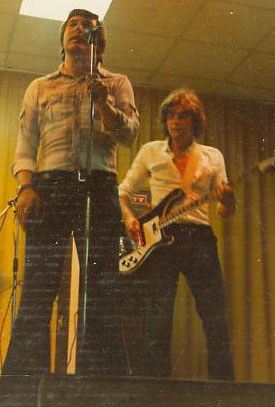
So on October 21st, 1995 the Parochiezaal in Rijkevorsel was completely sold out with 1200 people to see this legendary band together again on stage. With two support acts (one of them was Black Cat Bone the new band from Gust and Tex) it was already after midnight when the legend finally took the stage. The boys still delivered well, but many people were disappointed that the set were almost only cover-songs (from the album only Born & Still Alive was played) while their own Mustang classics kept untouched. To see Guy enjoying himself that much and even reaching all high notes in a Deep Purple classic made everyone wondering why on earth he had stopped singing, seventeen years ago…

Unfortunate, this concert was the last time we could hear this fantastic voice of Guy “Danny Morgan” Mertens as now he suffers some health problems.
After all those years the Mustang music still stands by those lucky enough to know it; although it has never been re-released on cd despite the popular demand. Guy who owns the tapes once thought of it and therefore had them remixed, but until now they remain in the closet.

/header

7” Stop It Baby / Shake It (Ideal records 524 — 1968)
.
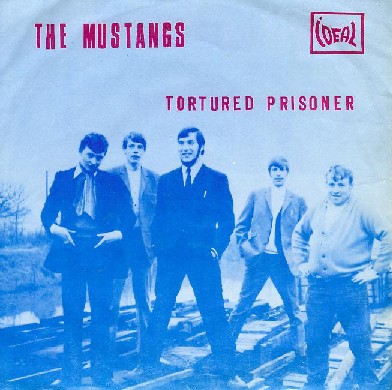
7” Tortured Prisoner / In A Moment Of Love Darkness (Ideal records 539 — 1969)

7” Sweeter Than Honey / What A Mess (Ideal records 556 — 1972)
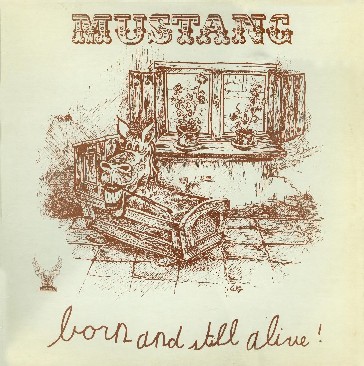
Lp BORN AND STILL ALIVE (Eagle System MLP 0255/825 — 1977)
-Exit Please
-Kickin’ In Blind Doors
-Fly-O High-O
-Pocket Lover
-Born And Still Alive
-Wicked Old Ricky
-Are We Getting Old
-The Man Who Lives Next Door

Lp JEUZELFESTIVAL (Monopole MLP 0169/844 — 1977)
-Baby What You Want Me To Do
-States Boro Blues

Lp THE BIG FREEZE Vol.2 (Dodecaphone 002 — 1997)
-Tortured Prisoner
